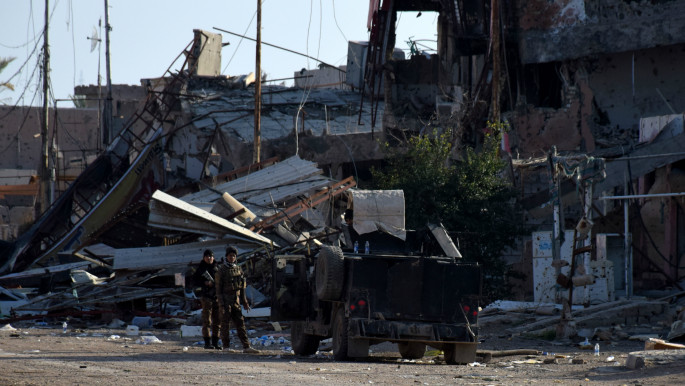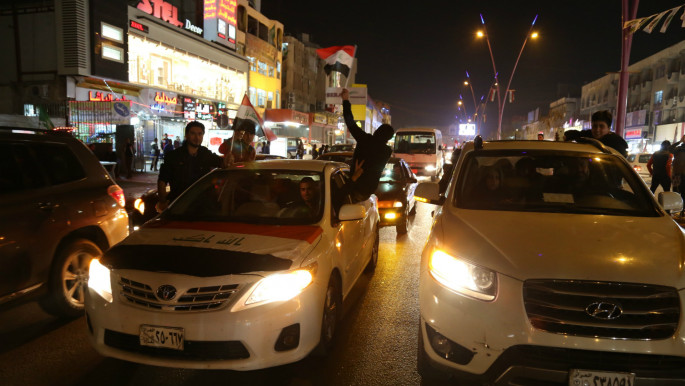Iraq: 80% of Ramadi destroyed
The city of Ramadi has been destroyed by Islamic State group car bombs, booby-traps, Iraqi and coalition forces airstrikes and bombardment, leaving behind bereaved families, orphans, and despair.
3 min read
Ramadi: A sacrificed city [The New Arab]
Islamic State group retreated from Ramadi, the capital of Iraq's Anbar province, after eight days of fierce battles that left nearly 80 percent of the city's infrastructure destroyed.
Neighbourhoods, homes, businesses, bridges, sewers, almost everything has been either destroyed by booby-traps and explosive devices that IS had set up everywhere around the city, or by Iraqi and US-led coalition forces airstrikes and artillery bombardment, as they sought to minimise casualties in their ranks.
It is a repeat of the same previous scenarios. Battles to regain Tikrit, Baiji, Jarf al-Sakhr, as-Siniyah, Sinjar, Jubba and al-Baghdadi have left the northern and western cities and towns disaster zones, with widespread destruction and disease, not suitable for living.
Whoever stands on the banks of the Euphrates River, west of Ramadi, will now be able to see the city centre or parts of the other side of the city.
The high-rise buildings, commercial and residential compounds are now hunched over or completely raised to the ground.
"This is what Daesh (IS) left behind in Ramadi," said Ahmad al-Assafi, one of the Sunni tribal leaders who are fighting the extremist group.
"The attacking forces preferred to destroy everything over suffering casualities and Daesh booby-trapped everything, the houses, buildings, shops, even electricity poles and sewerage manholes."
It would cost less to build a city from scratch somewhere else than to rebuild Ramadi, Assafi told The New Arab.
The level of destruction in Ramadi is around 80 percent, said Iraqi Minister of Defence Khaled al-Obeidi in a press conference on Tuesday.
He blamed IS for the devastation, describing Ramadi as a ghost city.
The security forces were not able to find a high-rise building to raise the Iraqi flag on top after liberating the city, Obeidi said. He pointed out that IS militants detonated 56 car bombs during the battle.
Iraqi Minister of Education Mohammad Iqbal said in a statement that 260 schools were destroyed in Ramadi, which will require half a billion US dollars to rebuild, according to the minister.
Ramadi's displaced
Many families who were able to flee the beleaguered city and take refuge somewhere else in the country celebrated the "liberation" of Ramadi, expressing feelings of Jubilation. But their joy was cut short when they heard that they will not be able to go back to their homes so soon.
"We were able to save the remaining families" in Ramadi, but "it is too soon to talk about the return of the displaced," Anbar province Governor Sabah al-Karhout told The New Arab.
Ramadi "was snatched from Daesh (IS) by force," he added.
Hundreds of families who took refuge in Bzaibiz refugee camp near Baghdad celebrated when they heard that the Iraqi forces had took control of the city. The picture became less shiny when they saw recent photos and videos of their hometown through Iraqi media outlets.
Haj Latif Abdulrahman, 56, told The New Arab that his house was completely destroyed.
"I don't know where to go when people have to go back home and the camp is closed down," said Abdulrahman.
"The caliphate's soldiers entered the city, destroyed part of it, and left the rest for the army to destroy when they decided to drive them out."
Losses to public and private property in Ramadi stand at over $20 billion according to the former security advisor to Anbar's governor, Fouad Ali.
Thousands lost their lives, said Ali, "and we now have a new army of orphans, widows, bereaved, and families who have no breadwinners; so how does the caliph feel now?"
Neighbourhoods, homes, businesses, bridges, sewers, almost everything has been either destroyed by booby-traps and explosive devices that IS had set up everywhere around the city, or by Iraqi and US-led coalition forces airstrikes and artillery bombardment, as they sought to minimise casualties in their ranks.
It is a repeat of the same previous scenarios. Battles to regain Tikrit, Baiji, Jarf al-Sakhr, as-Siniyah, Sinjar, Jubba and al-Baghdadi have left the northern and western cities and towns disaster zones, with widespread destruction and disease, not suitable for living.
Whoever stands on the banks of the Euphrates River, west of Ramadi, will now be able to see the city centre or parts of the other side of the city.
The high-rise buildings, commercial and residential compounds are now hunched over or completely raised to the ground.
"This is what Daesh (IS) left behind in Ramadi," said Ahmad al-Assafi, one of the Sunni tribal leaders who are fighting the extremist group.
 |
It would cost less to build a city from scratch somewhere else than to rebuild Ramadi - Tribal leader fighting IS |
 |
"The attacking forces preferred to destroy everything over suffering casualities and Daesh booby-trapped everything, the houses, buildings, shops, even electricity poles and sewerage manholes."
It would cost less to build a city from scratch somewhere else than to rebuild Ramadi, Assafi told The New Arab.
 |
The level of destruction in Ramadi is around 80 percent, said Iraqi Minister of Defence Khaled al-Obeidi in a press conference on Tuesday.
He blamed IS for the devastation, describing Ramadi as a ghost city.
The security forces were not able to find a high-rise building to raise the Iraqi flag on top after liberating the city, Obeidi said. He pointed out that IS militants detonated 56 car bombs during the battle.
Iraqi Minister of Education Mohammad Iqbal said in a statement that 260 schools were destroyed in Ramadi, which will require half a billion US dollars to rebuild, according to the minister.
Ramadi's displaced
Many families who were able to flee the beleaguered city and take refuge somewhere else in the country celebrated the "liberation" of Ramadi, expressing feelings of Jubilation. But their joy was cut short when they heard that they will not be able to go back to their homes so soon.
 |
|
| Celebrations in the Iraqi capital Baghdad following the announcement Ramadi was liberated from IS [Anadolu] |
"We were able to save the remaining families" in Ramadi, but "it is too soon to talk about the return of the displaced," Anbar province Governor Sabah al-Karhout told The New Arab.
Ramadi "was snatched from Daesh (IS) by force," he added.
Hundreds of families who took refuge in Bzaibiz refugee camp near Baghdad celebrated when they heard that the Iraqi forces had took control of the city. The picture became less shiny when they saw recent photos and videos of their hometown through Iraqi media outlets.
 |
We now have an army of orphans, widows, bereaved... how does the caliph feel now? - Former security advisor to Anbar's governor, Fouad Ali |
 |
Haj Latif Abdulrahman, 56, told The New Arab that his house was completely destroyed.
"I don't know where to go when people have to go back home and the camp is closed down," said Abdulrahman.
"The caliphate's soldiers entered the city, destroyed part of it, and left the rest for the army to destroy when they decided to drive them out."
Losses to public and private property in Ramadi stand at over $20 billion according to the former security advisor to Anbar's governor, Fouad Ali.
Thousands lost their lives, said Ali, "and we now have a new army of orphans, widows, bereaved, and families who have no breadwinners; so how does the caliph feel now?"
![Ramadi: the sacrifice of the city [al-Araby al-Jadeed] Ramadi: the sacrifice of the city [al-Araby al-Jadeed]](/sites/default/files/styles/image_345x195/public/media/images/B22B5911-C3D7-482A-BBA2-9E4985318858.jpg?h=d1cb525d&itok=ZEeVpObn)



 Follow the Middle East's top stories in English at The New Arab on Google News
Follow the Middle East's top stories in English at The New Arab on Google News


